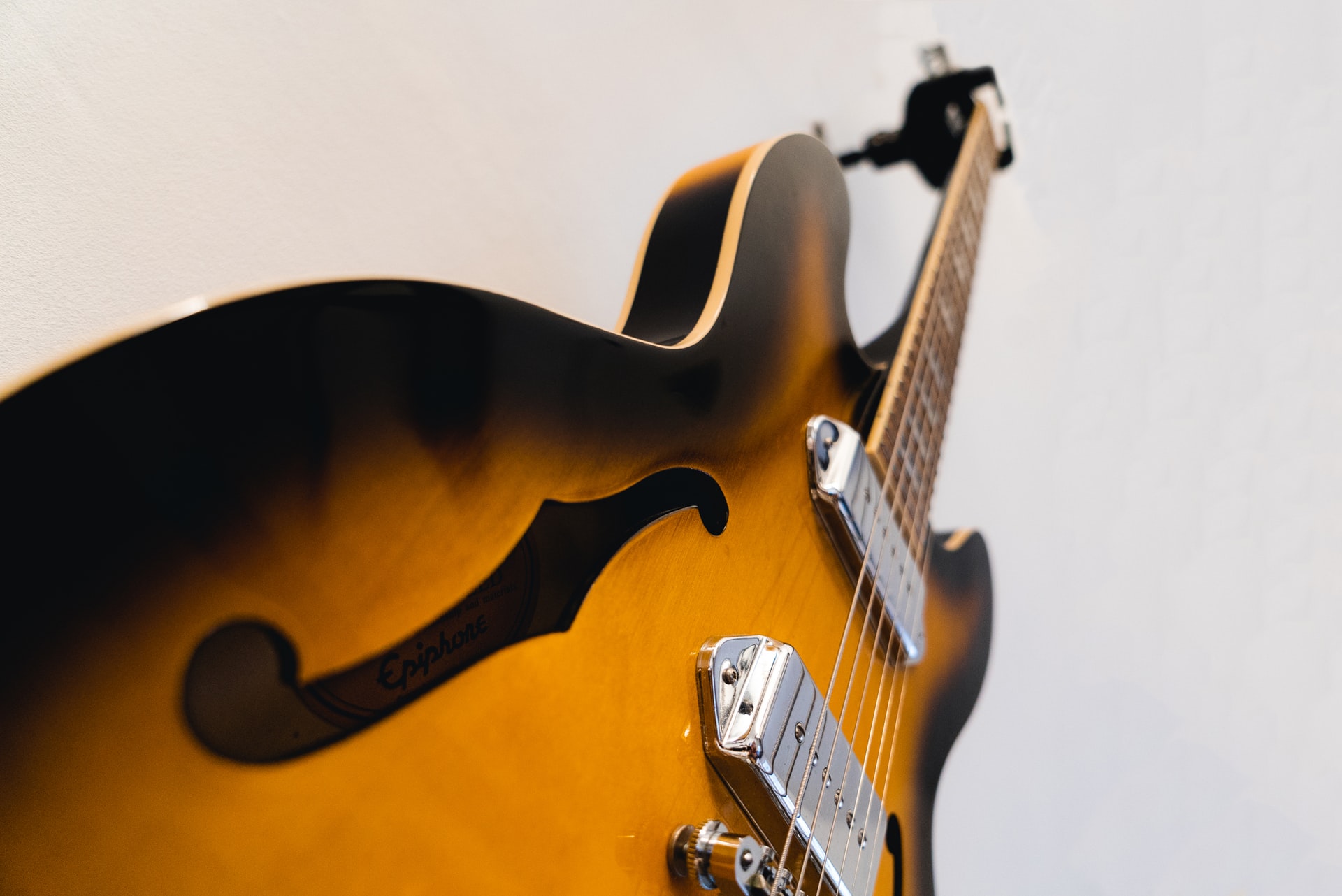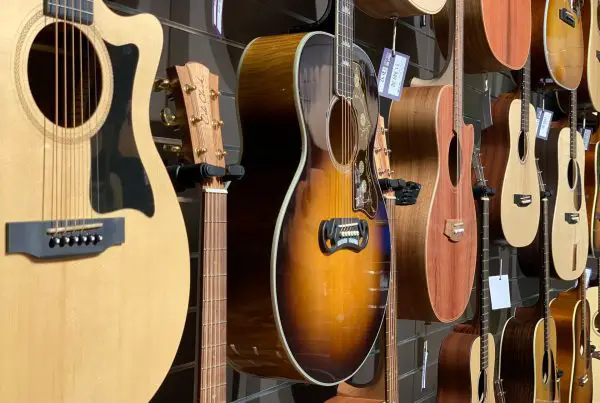Bass pickups and guitar pickups are not interchangeable. The string spacing and pole pieces between bass and guitars are different.
Putting a guitar pickup on bass would result in poor sounds because the vibrations are not picked up.
But having said that, it’s not like they won’t work at all. In some cases they actually do. My luthier friend is always experimenting with stuff, and once he put a Strat-style pickup on a short-scale bass and it worked surprisingly well.
But will it be smart for you to do that? Are there actually any basses that fit guitar pickups in? We will cover that in this blog.
You’ll learn what string-spacing is, what kind of guitar and bass pickup are there, and what are the best manufacturers of them in the world. And a few more things regarding pickups.
So here are the topics I will cover in this article:
- What Is The Difference Between Bass And Guitar Pickups?
- Bass Vs Guitar Pickups (string spacing, tone and use for distortion)
- Expensive pickup vs cheap pickup
- Types of guitar pickups
- Types of bass pickups
- Conclusion.
What Is The Difference Between Bass And Guitar Pickups?
The physical shapes and sizes of bass and guitar pickups are different. A guitar pickup is not meant for a bass-routed-out slot. Also, the bass pickups are much larger – so they won’t fit in an electric guitar.
Outputs of the pickups are also different, so the sound will be a little different.
That said, guitar and bass pickups are not drop-in replacements for one another and there are practical reasons why they don’t interchange. Let’s see some differences in the pickups and what they are designed for.
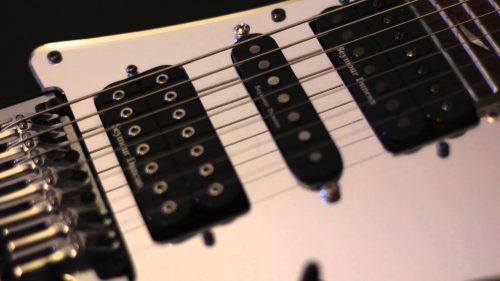
The slot and spacing in guitar pickup is much smaller than bass. They are not interchangeable.
Bass Vs Guitar Pickups
| Bass pickup | Guitar pickup | |
| Frequencies | Lower | Higher |
| Size | Bigger | Smaller |
| Use for distortion | No | Yes |
| Tone | Deeper | Glassy |
| Humbucker type | Yes | Yes |
| Single-coil type | Yes | Yes |
With all that in mind, they are not that very different technologically speaking. All pickups are magnets with coils of wire around them.
Bass pickup is an electromagnet, a magnet, and a coil, just like a guitar pickup. The technical concept is identical, with only differences in size.
A guitar pickup will still pick up the signal of an electric guitar, and a bass pickup can still pick up the signal of a guitar.
So you can switch between them if you’re willing to modify your guitar to accommodate the room needed to put in a bass pickup.
Personally, I wouldn’t do it. Cause, this will greatly reduce the retail value of your guitar. And I don’t think it will make it sound better.
On various guitar and bass forums, you can see guitars with bass pickups and vice versa. On these instruments, the owners literally chiseled out wood or plastic to fit the pickup on purpose and angled the pickups to overcome string spacing issues.
String Spacing: Bass Vs Guitar Pickups
Bass spacing is much wider than guitar string spacing. Which is why they are not interchangeable. Bass and guitar pickups will simply not fit each other (unless you perform custom modifications.
Guitar string spacing is the measurement of physical length between the highest lowest and the highest string.
Wrong string spacing can cause some strings to have lower output while others may perform much louder.
We could for example take the Guitar humbucker pickups. They usually come in one of three spacings: 49.2mm, 50mm, and 53mm. Using a 53. mm humbucker on a guitar with 49.2mm spacing will cause the outer E strings to have much lower outputs than all other 5 strings.
But from my personal experience, it’s not the deal-breaker. I’ve had a Fender Stratocaster guitar equipped with a Seymour Duncan SH-4 pickup with string spacing for a Les Paul guitar, and it works just fine.
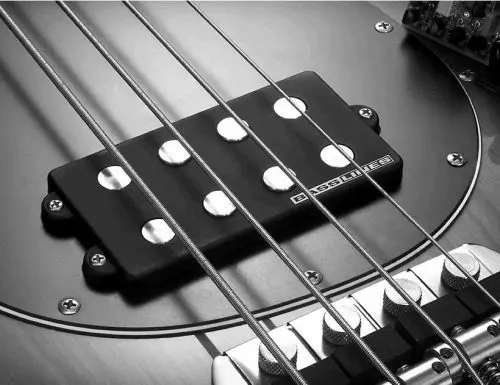
Bass pickups have much more spacing than guitar pickups.
Tone Difference: Bass Vs Guitar Pickups
Bass pickups produce a much lower pitch sound than guitar pickups because they have much heavier string gauge on bass.
When companies create bass pickups, they tend to focus on keeping the natural deep character of a bass – more muddy and bassy sound. Whereas on guitar pickups, companies often go for high treble, high gain and distortion.
For bass pickups, this is not so important. Most bass players don’t use overdrive or distortion at all.
Use For Distortion: Bass Vs Guitar Pickups
Bass pickups are not suitable for distortion. The tone is too deep and low pitched. On the other hand, electric guitar pickups are designed specifically for distortion and gain.
If you are a player who likes to use distortion, focus solely on good guitar pickups and amps. Don’t tinker around with bass pickups for distortion – you will not get the desired result.
Will guitar pickups work on a bass?
Guitar pickups can work on a bass if you perform custom modifications. Without modifications, stock guitar pickups will not work on a bass because they won’t fit.
That said, there is a bass that uses guitar pickup – Fender Musicmaster Bass. If you look at the bass, you’ll see a pickup that resembles a guitar pickup. It is a type of Stratocaster pickup and even has 6 magnetic poles underneath the cover.
Just like a guitar, and not 4 like a bass pickup. And, it fits in the same cavity, so you can take any Strat-style pickups on the market and put it in, and it will fit both the pickguard and the cavity.
Supro Huntington bass is one more example. These basses are fitted with the industry’s standard humbucker-sized pickups of electric guitars.
So again like in the one earlier where you could replace the single-coil style pickup, here you can put any humbucker style pickup that is on the market.
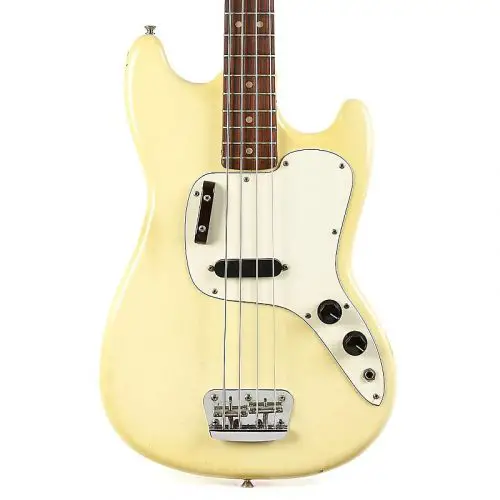
Fender Musicmaster Bass
Expensive Pickup Vs Cheap Pickup
Cheaper pickups are usually created using cheaper materials, weaker magnets, lower quality plastic, copper winding won’t be as pure, and everything will be a little bit worse. Also, the companies creating cheaper pickups are usually not well known.
Whereas more expensive pickups usually come from a well-known company and the pickups were built to the highest standard with proper quality control.
If you get for example a Seymour Duncan pickup, you’ll be sure that the pickup was made in the USA, using only the best materials, and there were no cutting costs in creating ones.
This is the reason why they’ll be the best option for the sound you are trying to get.
Now saying that, the pickups are not the only component to the sound. The amplifiers play a major role in the sound of your bass or guitar.
So if you have a cheap amp, don’t even waste your money on expensive pickups, they won’t do what they’re meant to.
Types of Guitar Pickups
Like I already wrote, there is more than one type of pickup. Guitar pickups can be divided into three main categories: single-coil, humbucker, and P-90.
1. Single-coil
Single coil pickup uses a single magnet. A good example of a single-coil pickup is the pickups on a Fender Telecaster. They’re considered to be brighter than humbuckers or P90s.
The genres that use single-coil pickups include country and surf, but they sound great in almost any genre of music. Their only weakness is that they don’t handle high levels of overdrive or distortion as humbuckers.
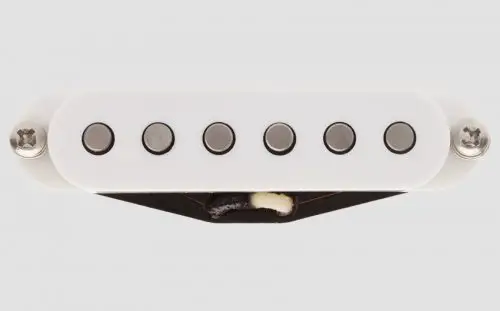
Single coil pickup
2. Humbucker
Humbuckers are two single-coil pickups working together. Single coil pickups are subject to 60-cycle hum, a phenomenon where background electrical noise is transferred to your amp along with your strings’ vibrations.
They were designed to avoid that hum, it’s what they’re named after. They have a warm tone in comparison to single-coil pickups, which is why they’re the pickup of choice for jazz.
But, due to their higher output, they are better than single-coil pickups in genres where high levels of distortion are required, such as rock or metal.
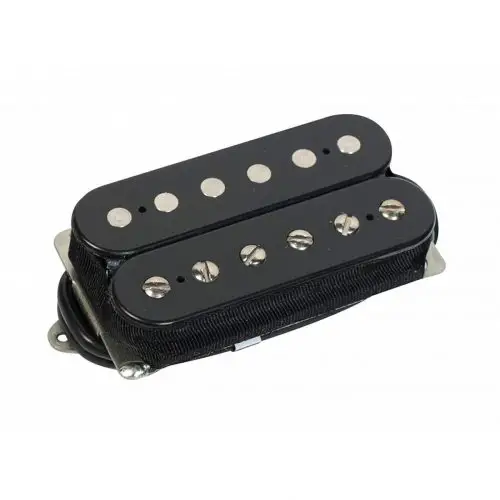
Humbucker pickup
3. P-90
P90 pickup is the middle between single-coil and humbucker pickups. They have a higher output than single-coil pickups, but they don’t have the output of humbuckers. Their tone has a bit more depth than a standard single-coil, but not to the extent of humbuckers.
P-90 pickups are best suited to blues and rock, but they’re relatively versatile, and with them, you can really play any genre you want.
Related article: Are Guitar Pickups Universal & Interchangeable? (Size & Brand)
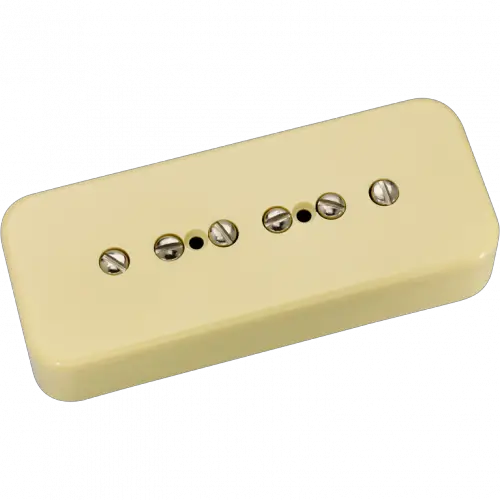
p90 pickup
Types Of Bass Pickups
Like with the guitars, there are two basic construction types for bass pickups, which are defined by the number of coils used: single-coil and humbuckers.
But due to the different construction, they are divided into different categories and they are; J-Pickups, Split-coil, Double-coil, Soapbar.
1. J-Pickups
J-Pickups were first used on Fender Jazz Bass, and because of this are still associated with the instrument. They have a warm and clear tonality and are commonly used by jazz musicians. But they’re also common in blues, rock, and funk.
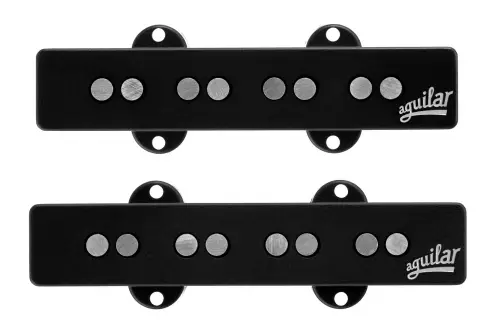
J Pickups
2. Split-coil pickups
Split-coil pickups consist of a single coil surrounding the magnetic or magnetized pole piece screws. Single coils produce a brilliant, very clear, and open sound.
However, their single-coil construction makes them sensitive to ambient sound resulting from electromagnetic emissions from radios, neon tubes, or transformers.
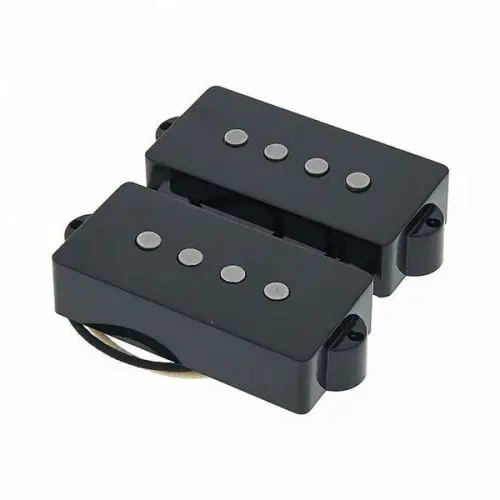
Split coil pickups
3. Double-coil pickup
Double coil pickups are basically humbucker pickups. They aren’t as common as J or Split-coil pickups. These pickups, like humbuckers on a guitar, have a significantly warmer tone than single-coils.
They’re great if you’re looking for a more vintage bass tone. The mids become more pronounced and while it loses some of the brilliance compared to single coils, it gains power and drives.
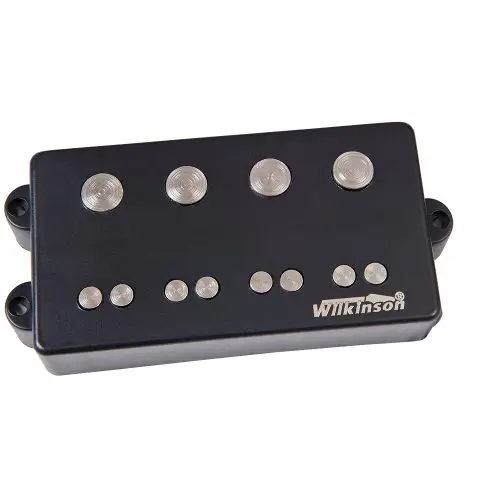
Double coil pickup
4. Soapbar pickup
Soapback pickups are essentially J-bass pickups with wider housing. There is also a difference that these pickups are actually sealed, which helps to protect them from degradation.
They also have pins that protrude from the bottom of the pickup in order to facilitate different wiring combinations.
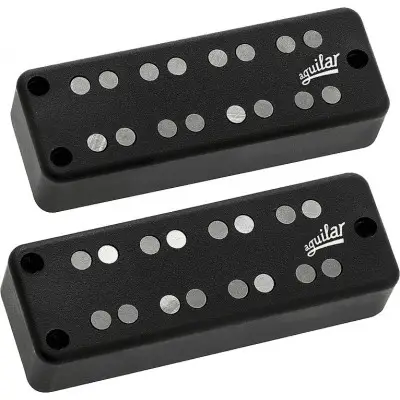
Soapbar pickup
Best Pickup Manufacturers
Nowadays there are quite a few companies that are producing pickups. There are the ones doing it for their own needs because they are also making instruments. But there are companies that are specialized only for pickup production.
Some of them are making both bass and guitar pickups, some are specialized for either.
So let’s take a look at who they are:
Best brand for bass pickups:
- Aguilar
- Bartolini
- Fender
- Nordstrand
- Seymour Duncan
- DiMarzio
- EMG
Best brand for guitar pickups:
- Seymour Duncan
- EMG
- Gibson
- Fender
- DiMarzio
- Bare Knuckle
- Fralin
- Lollar
- Fishman
Conclusion
So, from this blog we’ve learned that the bass and guitar pickups are not interchangeable. Well, mostly they aren’t, because we’ve seen in some cases they can be.
I wouldn’t recommend you modify your prize guitar, just to fit a bass pickup in and vice versa. Because doing this you will significantly reduce the value of your instrument.
But, if you have some cheap guitar laying under your bed that you don’t use anymore, it’s worth nothing to you, and you’re an adventurous spirit, always pushing the boundaries, I encourage you to try to put a bass pickup on it.
In theory, it will work. And who knows maybe you’ll get some specific sound out of it, that you couldn’t get from anywhere else. And that could be an inspiration for something new in your playing.


